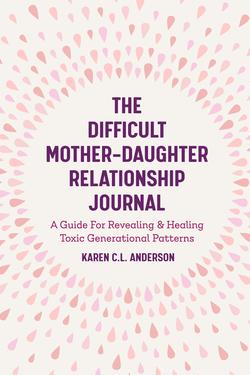Читать книгу The Difficult Mother-Daughter Relationship Journal - Karen C.L. Anderson - Страница 10
На сайте Литреса книга снята с продажи.
ОглавлениеIntroduction
Who is this guided journal for?
It’s for you if…
•You struggle in your relationship with your mother and want it to be better.
•You struggle in your relationship with your daughter…she’s changed, and you don’t understand her anymore.
•You wish to no longer be in contact with your mother, without guilt.
•You are estranged from your daughter, not by your choice.
•You are estranged from your mother and you either no longer want to feel badly about it or want to reestablish contact but don’t know how.
•You are the mother of a daughter and want to “break the cycle.”
•She has died, and you have unresolved pain in regards to your relationship with her.
Note: If you are actively processing trauma, some of the prompts and practices in this journal may be triggering. Please seek out therapy if this applies to you. The “Resources” section on page 149 includes the websites of organizations where you can find therapists and other practitioners who specialize in such modalities as EMDR (Eye Movement Desensitization and Reprocessing therapy), somatic experiencing, Internal Family Systems, and others.
D
This guided journal includes insights, prompts, and practices that will help you…
•Access your own wisdom.
•Better see and understand the painful patterns that have come to you and through you via your maternal lineage.
•Heal those patterns so they no longer create suffering.
•Have a relationship built on healthy interdependence rather than dysfunctional codependence (assuming she is capable, which she very well may not be and that is not your fault or your responsibility).
•Set and maintain healthy boundaries.
•Accept what is, as is, even if she isn’t ready for what you want.
As you work your way through this guided journal, let yourself know what you know, want what you want, and not want what you don’t want.
Don’t underestimate the simplicity of the prompts and practices. Each one builds on the previous one and represents your on-going evolution, guiding you to more of what you want in your life and relationships, not just with her, but with yourself and in the greater world.
Writing is powerful, and it’s good for you. It helps you acknowledge, cope with, and resolve that which you struggle with. It’s both the medicine and the sugar.
Writing clarifies, reduces stress, helps you solve problems from an intuitive, creative place, and helps you integrate what you’re learning. It’s one thing to consume information—it’s another to act on it.
It takes courage to do this work. Intense emotions may come up as you make your way through the journal. You might find yourself feeling everything from guilt to anger to grief, but I hope you will also experience joy, laughter, and relief.
Note: If doing any of these practices is uncomfortable or distressful in any way, stop. Also, know what I share in this book can be an effective companion to therapy, but it is not a replacement for it. If you are in therapy, you may want to share these practices with your therapist.
